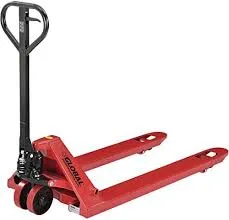


The Role and Impact of Pallet Truck Manufacturers in Modern Industry
Pallet trucks, also known as pallet jacks or pump trucks, play a crucial role in the logistics and warehousing sectors. These essential pieces of equipment are designed for the efficient movement of goods within a warehouse or distribution center. The demand for pallet trucks has spurred a robust market for manufacturers who provide various types of these devices, catering to the diverse needs of industries worldwide.
Overview of Pallet Truck Types
Pallet trucks come in various forms, each designed for specific applications. The most common type is the manual pallet truck, which is operated by hand and is ideal for lighter loads. However, as industries evolve, there is a growing demand for more advanced versions. Electric pallet trucks, for instance, have emerged as a popular option for medium to heavy loads, with ease of use and reduced physical strain on operators being key benefits.
Additionally, manufacturers have begun producing specialized pallet trucks, such as high-lift pallet trucks for handling pallets at various heights and pallet trucks equipped with scales for weighing goods during transportation. Automated pallet trucks, which are part of the broader trend toward automation, also showcase the innovation within the industry, allowing for increased efficiency and safety in the handling of materials.
Importance of Manufacturers
Pallet truck manufacturers play a pivotal role in ensuring that businesses have access to reliable, safe, and efficient equipment. The relationship between manufacturers and businesses goes beyond mere transactions; it encompasses support services such as maintenance, training, and parts supply. This partnership is crucial, as the operational efficiency of a warehouse heavily relies on the equipment’s reliability.
Leading manufacturers invest significantly in research and development to stay competitive. They incorporate the latest technologies, such as ergonomic designs and advanced materials, to improve safety and user comfort. For example, pallet trucks now feature adjustable handles, enhancing maneuverability and reducing physical strain on operators. Many manufacturers are also focusing on reducing the environmental impact of their products by developing models that are more energy-efficient, thus addressing the industry's growing sustainable practices.

Global Market Trends
The global pallet truck market has been witnessing steady growth, fueled by e-commerce and the increasing need for effective logistics solutions. As online shopping continues to rise, warehouses are working to optimize their operations to accommodate higher volumes of goods. This growth has prompted manufacturers to innovate continually, producing equipment that not only meets current demands but is also adaptable for future needs.
Geographically, the market is expanding, particularly in emerging economies where industrialization and infrastructural development are on the rise. Manufacturers are often looking towards these markets as opportunities for growth, tailoring their products to meet the specific needs of local businesses, which might be different from those in more developed regions.
Challenges and Future Outlook
Despite the flourishing market, pallet truck manufacturers face challenges such as raw material costs and the need for constant innovation to keep up with technological advancements. Additionally, the ongoing push for sustainability means that manufacturers must navigate the complexities of producing environmentally friendly products.
Looking ahead, the future of pallet truck manufacturers seems promising. As automation becomes more prevalent and the demand for sustainable practices intensifies, manufacturers who adapt and innovate are likely to thrive. The commitment to quality, safety, and technological integration will define the next generation of pallet trucks, making them even more indispensable in the competitive landscape of logistics and supply chain management.
In conclusion, pallet truck manufacturers are key players in the modern industrial ecosystem, continually innovating and adapting to meet the ever-evolving needs of the market. As they rise to the challenges of sustainability and technological advancement, their impact will only grow, ensuring that pallet trucks remain an essential tool for efficiency in logistics and warehousing.



